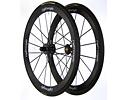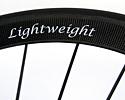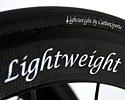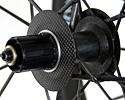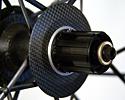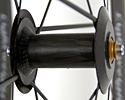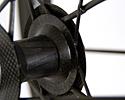
Recently on Cyclingnews.com |
On Test: CarbonSports Lightweight Standard Generation III wheelset, March 13, 2008
Superb race wheels for the well-heeled
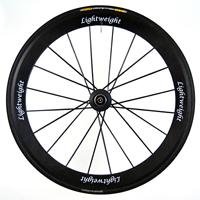
|
CarbonSports' Lightweight carbon wheels can be found on a substantial number of notable ProTour riders' bikes past and present regardless of their official wheel sponsor. Can they possibly be that good? Cyclingnews Technical Editor James Huang thinks so.
The recipe
CarbonSports' Lightweight Standard Generation III is one of a growing number of wheelsets that promises to combine the typically mutually exclusive attributes of light weight, aerodynamics and stiffness. The numbers are certainly compelling: our SRAM/Shimano test set arrived with a set of Continental Competition tubulars yet still weighed just 1620g for the pair without skewers. Once you back out the typical weight of the rubber, the associated valve extenders and glue, the weight is just about spot-on with Lightweight's claimed figure of 1075g. Bam!
True to its name, CarbonSports makes liberal use of carbon fiber for both the wind-cutting 53mm-deep V-shaped full-carbon tubular rim and both hub shells. The lens-shaped spokes are also 100 percent carbon, an upgrade from the previous generation's carbon-and-aramid blend. All of the bits are then assembled by hand and co-molded together to create a single structure.
About the only non-carbon bits lie within the hubs. CarbonSports wisely outsources the internals to DT Swiss and the usual 240s internals are all there, including the alloy freehub body (easily interchangeable between Shimano/SRAM and Campagnolo), star ratchet drivers, cartridge bearings and alloy axles and end caps.
Noteworthy details include a small magnet molded right into the rim for use with a cycle computer as well as a small embedded memory chip that stores each individual wheel's serial number, production conditions and trueness as it left the factory.
The taste test
Even with its impressively low mass and aero-looking shape, a US$4,500 price tag carries some high expectations but we quickly realized just what it is about the Lightweights that makes them so highly prized among the pros. Far and away, the wheelset's overwhelming characteristic is its rigidity, both torsional and lateral.
CarbonSports claims the new carbon spokes add 30 percent more stiffness as compared to Generation II and we have little reason to dispute this. The Lightweights offer up a sense of 'right now' urgency under power that eclipses nearly every other high-end race wheel we've tested. In addition, there is absolutely no sideways wag or wobble when sprinting or climbing out of the saddle or under hard cornering, even with just 16 spokes up front and 20 in the rear. For bigger riders, CarbonSports even offers the front in a 20 spoke configuration; conversely, lighter riders can go with just 12.
As expected, that rigidity does also yield a rather stiff ride but it wasn't objectionable in most situations. Moreover, the supple Continental tubular tires and carbon's inherent damping characteristics did much to smooth things out. We might refrain from using these in a cyclocross application for that reason (Hanke Kupfernagel would apparently disagree) but found the Lightweights to be utterly fantastic on the road overall.
The wheels' light weight pays the usual dividends. Acceleration from either a standstill or while already under way is as one would expect of a sub-1100g wheelset. In contrast to most true featherweights, though, the Lightweights are equally at home heading uphill, breaking speed limits down fast descents or hauling on the flats.
Speaking of speed, the aero shapes were noticeably effective as compared to non-aero wheels. Given the nature of physics, the Lightweights also offered up an increasing advantage over those non-aero hoops as the speeds climbed. Crosswind performance expectedly suffers, though. With so much surface area and so little rotational inertia, the Lightweights are a definite handful when the winds are swirling, especially at high speeds.
Regardless of our perception, there's still apparently some debate as to whether or not a V-shaped rim is as fast as a toroidal or airfoil-profiled rim but we won't dare speculate without the benefit of a wind tunnel at our disposal. Even if the Lightweight profile carries with it a marginal aero penalty, we'd almost argue that their rigidity might very well make up for it under most non-time trial situations.
Braking performance was quite good as well, in spite of the fact that CarbonSports adds no special surface treatment or texture to the Lightweights' sidewalls. Much of the credit probably should go to the included brake pads which are specially made for CarbonSports by SwissStop. The grey compound pads are noticeably squishier than SwissStop's own carbon-specific Yellow King blocks and yield a spongier feel at the lever but they worked surprisingly well regardless with a marginally grabby initial bite and good modulation. We unfortunately didn't test them in the wet, though.
The sub-1100g weight would typically demand delicate treatment with a conventionally spoked wheel but we never had any durability issues with our Lightweights during four months of testing. Given the effectively one-piece construction and carbon's inherent unwillingness to bend, there's simply nothing to loosen up and no good reason to go out of true. Barring catastrophe or a joint failure, the Lightweights should also stay that way for the duration and certainly did so for us. If not, wheels can be sent back to CarbonSports for repair… for a substantial fee, we'd imagine.
Mmm… yummy!
Cost issues aside, the Lightweights are quite possibly the finest overall race wheel we've sampled to date. There are others that are as light, as fast or as stiff but it's extremely rare to find all of those qualities in one wheel (although a head-to-head with substantially cheaper and seemingly similar Mavic's Cosmic Carbone Ultimate might be in order here). CarbonSports even now offers the Lightweight wheel in a clincher version. What's not to like?
Oh, right. Stellar performance or not, US$4,500 is an astronomical price for a pair of wheels and the vast majority of general consumers would never even dream of such an expenditure. Even so, the best argument in support of the Lightweights may come from the pros themselves. In spite of the wheels' prevalence in the peloton, only Erik Zabel and Filippo Pozzato are officially supported by CarbonSports.
As such, riders such as Mario Cipollini, Paolo Bettini and even Lance Armstrong have reportedly had to buy their Lightweights out of either the team or personal budget. Apparently a set of rainbow stripes (or a few yellow jerseys) doesn't buy much in Germany. Skeptics will be happy to hear that we've heard this from a number of sources outside of CarbonSports so we're quite confident it's factual.
In addition, virtually every one of those riders has to add a specific clause in their contracts allowing them to use Lightweights in competition and Bettini was even supposedly fined a whopping US$40,000 or so for using them in the Italian national championships one year.
Fine, so they're far from a bargain and well, well into the realm of diminishing returns. But if the current two-time world champion is willing to shell out US$40,000 for his pair, shouldn't they be worth US$4,500 to you? Who ever said your kids had to go to college?
Price: US$4,500
Weight: Approximately 1070g/pair (455g front/615g rear, without skewers)
Pros: Superlight weight combined with extraordinary stiffness and slippery
aerodynamics, reliable DT Swiss hub internals, integrated magnet and microchip,
repairable
Cons: Price is not for the faint of heart
Cyclingnews rating: ![]() (ignoring cost);
(ignoring cost); ![]() (factoring in cost)
(factoring in cost)
More info: www.carbonsports.com/
Photography
For a thumbnail gallery of these images, click here
Images by James Huang/Cyclingnews.com
- The CarbonSports Lightweight Standard Generation III is arguably one of the most sought-after wheelsets in the pro peloton.
- Even at just 1075g per pair , the carbon rims are still a wind-cutting 53mm deep.
- There is no special surface treatment applied to the Lightweight rim but braking with the included SwissStop-made pads was still quite good.
- The rear hub shell is also made of carbon as are the lens-shaped spokes.
- Rear hub internals are made by DT Swiss and are a virtual carbon copy of its successful 240s model.
- The front hub is also crafted from carbon.
- Spokes, hubs and rims are all co-molded together to form a monolithic structure.
- The rear wheel is fitted with 20 spokes laced in a one-cross pattern.
- The front wheel spoke lacing is also one-cross all around but CarbonSports offers 12-, 16-, and 20-spoke options depending on the application.
- Widely spaced flanges contribute to the wheels' stiff feel.

